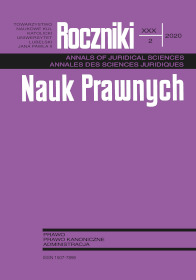Administrative and Legal Nature of Granting City Status at the Request of the Commune
Abstract
The creation, merging and erasing of municipalities and poviats is the responsibility of the Council of Ministers, which makes these changes by way of a regulation. It is not clear from the regulations what should distinguish a rural from an urban commune. The city should have social and technical infrastructure as well as urban layout and nature of buildings. In the Act on commune self-government, settlement and spatial boundaries, taking into account social, economic and cultural ties as well as ensuring the ability to perform public tasks, were indicated as criteria for changes and establishing the boundaries of communes. The lack of a legal definition of municipal rights and specific conditions to be met by a town or commune seeking to obtain the status of a city seem to be in conflict with the principle of legal certainty, which is also influenced by the wide scope of administrative discretion. Obtaining the status of a city satisfies the ambitions of the inhabitants and gives the town a kind of prestige, mainly associated with promotional and marketing values. The status of the city is granted by way of a regulation of the Council of Ministers, which has a specific character - it does not establish general and abstract norms, but resolves the individual case of a commune or town.
References
Feja-Paszkiewicz Anna: Konsultacje z mieszkańcami na tle procedury nadania gminie lub miejscowości statusu miasta, „Samorząd Terytorialny” 2011, nr 10, s. 40-58.
Gawryluk Dorota: Wsie o miejskim rodowodzie – walory urbanistyczne i krajobrazowe, „Budownictwo i Architektura” 6 (2010), nr 1, s. 13-22.
Kulesza Michał: Zmiana granic, ale niekoniecznie właściciela (rozmowa z prof. Michałem Kuleszą), „Wspólnota” 2009, nr 47, s. 8-12.
Lisowska Agnieszka, Szmytkie Robert: Definicja miasta i kryteria miejskości w prawie polskim, [w:] Miasta, aglomeracje, metropolie w nurcie globalnych przemian, red. Katarzyna Kuć-Czajkowska, Monika Sidor, Lublin: Wydawnictwo UMCS 2014, s. 17-32.
Niewiadomski Zygmunt: Samorząd terytorialny, [w:] System prawa administracyjnego, t. VI: Podmioty administrujące, red. Roman Hauser, Zygmunt Niewiadomski, Andrzej Wróbel, Warszawa: C.H. Beck 2011, s. 97-217.
Nowińska Magdalena: Udział mieszkańców w procedurze zmiany granic gminy, [w:] Partycypacja społeczna w samorządzie terytorialnym, red. Bogdan Dolnicki, Lexis Nexis 2014 (wersja elektroniczna w systemie LEX).
Sanetra-Szeliga Joanna: Sektor kultury a rozwój gospodarczy miasta, [w:] Kultura a rozwój, red. Jerzy Hausner, Anna Karwińska, Jacek Purchla, Warszawa: Narodowe Centrum Kultury 2013, s. 413-434.
Sokołowski Dariusz: Miasta zdegradowane w województwie lubuskim, „Rocznik Lubuski” 44(2018), s. 257-275.
Sokołowski Dariusz: Miasta zdegradowane w zachodniej części województwa mazowieckiego, „Rocznik Towarzystwa Naukowego Płockiego” 2016, nr 8, s. 327-350.
Sokołowski Dariusz: Miasta zdegradowane we wschodniej części województwa mazowieckiego, „Zeszyty Naukowe Ostrołęckiego Towarzystwa Naukowego” 30(2016), s. 72-94.
Szmytkie Robert: Kryteria morfologiczne w procedurze administracyjnej nadawania statusu miasta, „Wiadomości Statystyczne” 63(2018), nr 12 (691), s. 40-56.
Szmytkie Robert, Krzysztofik Robert: Idea miejskości w Polsce, [w:] Przekształcenia regionalnych struktur funkcjonalno-przestrzennych, t. II: Zmiany funkcjonalno-przestrzenne miast i obszarów wiejskich, red. Beata Namyślak, (Rozprawy Naukowe Instytutu Geografii i Rozwoju Regionalnego, t. 20), Wrocław: Uniwersytet Wrocławski 2011, s. 25-40.
Szmytkie Robert: Miasta zdegradowane w Polsce jako potencjalne nowe miasta, [w:] Miasta zdegradowane i restytuowane w Polsce. Geneza, rozwój, problemy, red. Robert Krzysztofik, Mirek Dymitrow, Gothenburg: University of Gothenburg 2015, s. 299-318.
Ustawa o samorządzie gminnym. Komentarz, red. Paweł Chmielnicki, LexisNexis 2013.
Ustawa o samorządzie gminnym. Komentarz, red. Bogdan Dolnicki, wyd. II, wersja elektroniczna w systemie LEX.
Copyright (c) 2020 Roczniki Nauk Prawnych

This work is licensed under a Creative Commons Attribution-NonCommercial-NoDerivatives 4.0 International License.


